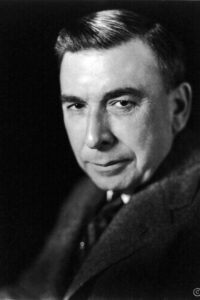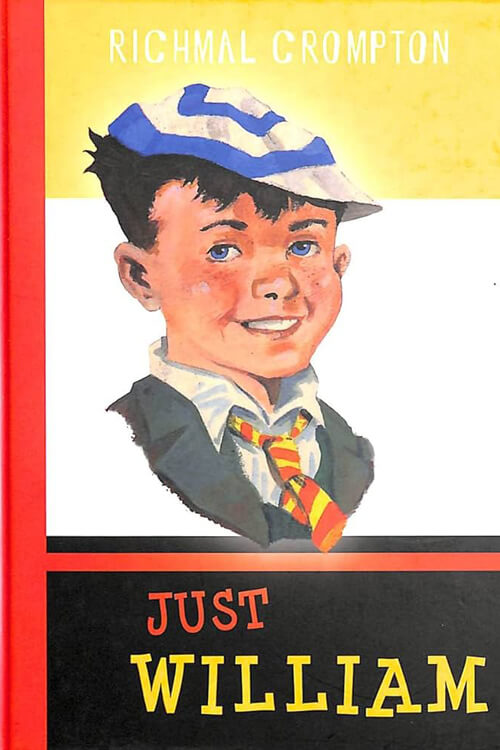
Seventeen, A Tale of Youth and Summer Time and the Baxter Family Especially William
William Sylvanus Baxter paused momentarily in front of the drug store at the corner of Washington Street and Central Avenue. He had an internal question to settle before he entered the store: he wished to allow the young man at the soda fountain no excuse for saying, “Well, make up your mind what it’s goin’ to be, can’t you?”
The rudeness of this kind, especially in the presence of girls and women, was hard to bear, and though William Sylvanus Baxter had borne it upon occasion, he had reached an age when he found it intolerable. Therefore, to avoid offering the opportunity for anything of the kind, he decided upon chocolate and strawberry, mixed, before approaching the fountain. Once there, however, and a large glass of these flavors and diluted ice-cream proving merely provocative, he said, lazily—an affectation, for he could have disposed of half a dozen with enthusiasm: “Well, now I’m here, I might as well go one more. Fill ‘er up again. Same.”
Emerging to the street, penniless, he bent a fascinated and dramatic gaze upon his reflection in the drug-store window, and then, as he turned his back upon the alluring image, his expression altered to one of lofty and condescending amusement. That was his glance at the passing public. From the heights, he seemed to bestow upon the world a mysterious derision—for William Sylvanus Baxter was seventeen long years of age, and had learned to present the appearance of one who possesses inside information about life and knows all strangers and most acquaintances to be of inferior caste, costume, and intelligence.
He lingered upon the corner awhile, not pressed for time. Indeed, he found many hours of these summer months heavy upon his hands, for he had no important occupation, unless some intermittent dalliance with a work on geometry (anticipatory of the distant autumn) might be thought important, which is doubtful, since he usually went to sleep on the shady side porch at his home, with the book in his hand. So, having nothing to call him elsewhere, he lounged before the drugstore in the early afternoon sunshine, watching the passing to and fro of the lower orders and bourgeoisie of the middle-sized mid-land city that claimed him (so to speak) for a native son.
Read or download Book
Booth Tarkington
Newton Booth Tarkington (July 29, 1869 – May 19, 1946) was an American novelist and dramatist best known for his novels The Magnificent Ambersons (1918) and Alice Adams (1921). He is one of only four novelists to win the Pulitzer Prize for Fiction more than once, along with William Faulkner, John Updike, and Colson Whitehead. In the 1910s and 1920s, he was considered the United States’ greatest living author. Several of his stories were adapted into film.
During the first quarter of the 20th century, Tarkington, along with Meredith Nicholson, George Ade, and James Whitcomb Riley helped to create a Golden Age of literature in Indiana.
Booth Tarkington served one term in the Indiana House of Representatives, was critical of the advent of automobiles, and set many of his stories in the Midwest. He eventually moved to Kennebunkport, Maine, where he continued his life work even as he suffered a loss of vision.
Early life and education
Tarkington was born in Indianapolis, Indiana, on July 29, 1869, the son of John S. Tarkington, a judge, and Elizabeth Booth Tarkington. He came from a patrician Midwestern family that had lost much of its wealth after the Panic of 1873. Tarkington was named after his maternal uncle Newton Booth, then the governor of California. He was also related to Chicago Mayor James Hutchinson Woodworth through Woodworth’s wife Almyra Booth Woodworth.
Tarkington attended Shortridge High School in Indianapolis and completed his secondary education at Phillips Exeter Academy, a boarding school on the East Coast. He attended Purdue University for two years, where he was a member of the Sigma Chi Fraternity and the university’s Morley Eating Club.
Some of his family’s wealth returned after the Panic of 1873, and his mother transferred Booth from Purdue to Princeton University. At Princeton, Tarkington is said to have been known as “Tark” among the members of the Ivy Club, the first of Princeton’s historic Eating Clubs. He had also been in a short-lived eating club called “Ye Plug and Ulster,” which became Colonial Club. He was active as an actor and served as president of Princeton’s Dramatic Association, which later became the Triangle Club, of which he was a founding member according to Triangle’s official history.
Tarkington made his first acting appearance in the club’s Shakespearean spoof Katherine, one of the first three productions in the Triangle’s history written and produced by students. Tarkington established the Triangle tradition, still alive today, of producing students’ plays. Tarkington returned to the Triangle stage as Cassius in the 1893 production of a play he co-authored, The Honorable Julius Caesar. He edited Princeton’s Nassau Literary Magazine, known more recently as The Nassau Lit. While an undergraduate, he socialized with Woodrow Wilson, an associate graduate member of the Ivy Club. Wilson returned to Princeton as a member of the political science faculty shortly before Tarkington departed; they maintained contact throughout Wilson’s life. Tarkington failed to earn his undergraduate A.B. because of missing a single course in the classics. Nevertheless, his place within campus society was already determined, and he was voted “most popular” by the class of 1893.
Many aspects of Tarkington’s Princeton years and adult life were paralleled by the later life of another writer, fellow Princetonian F. Scott Fitzgerald.






